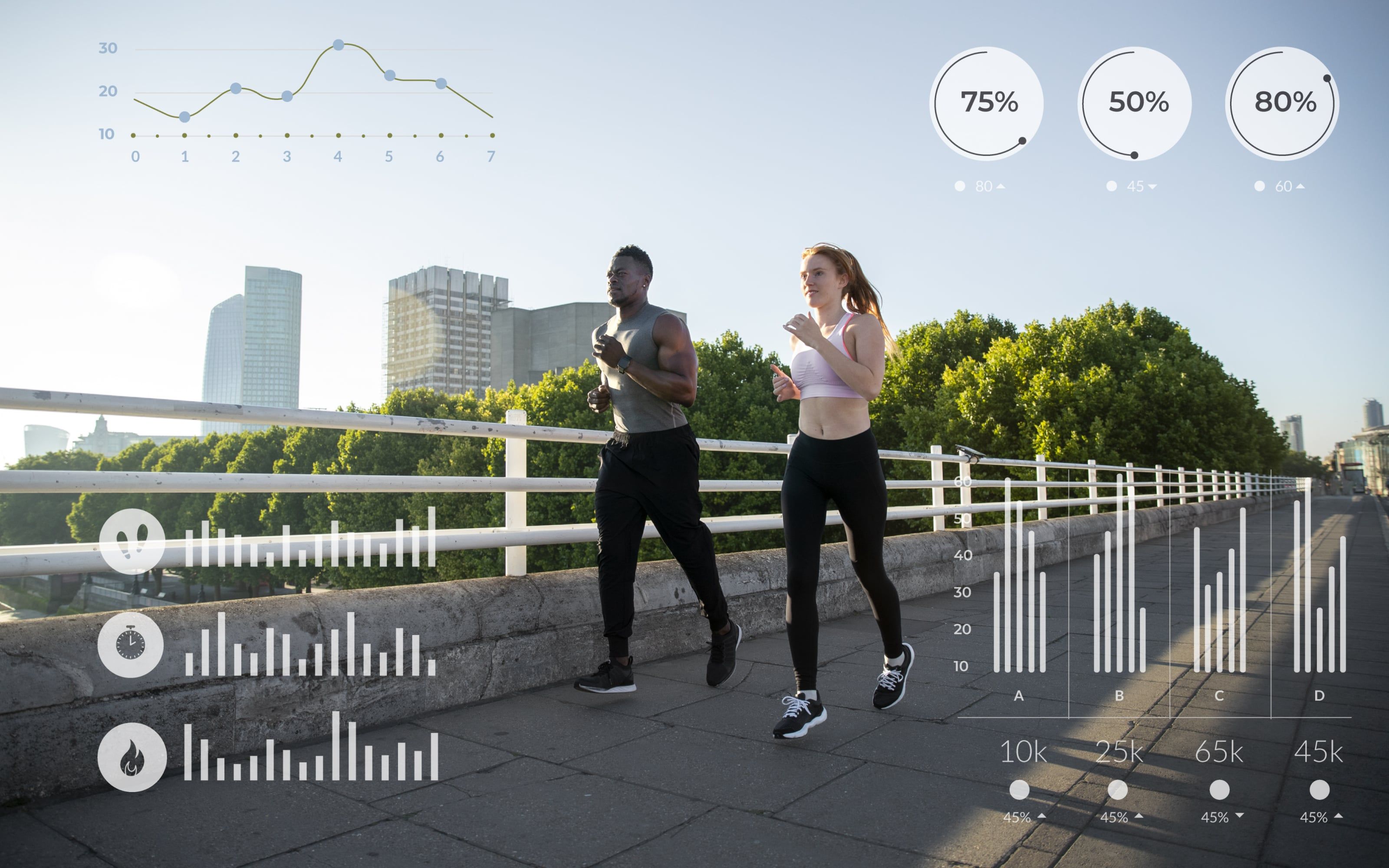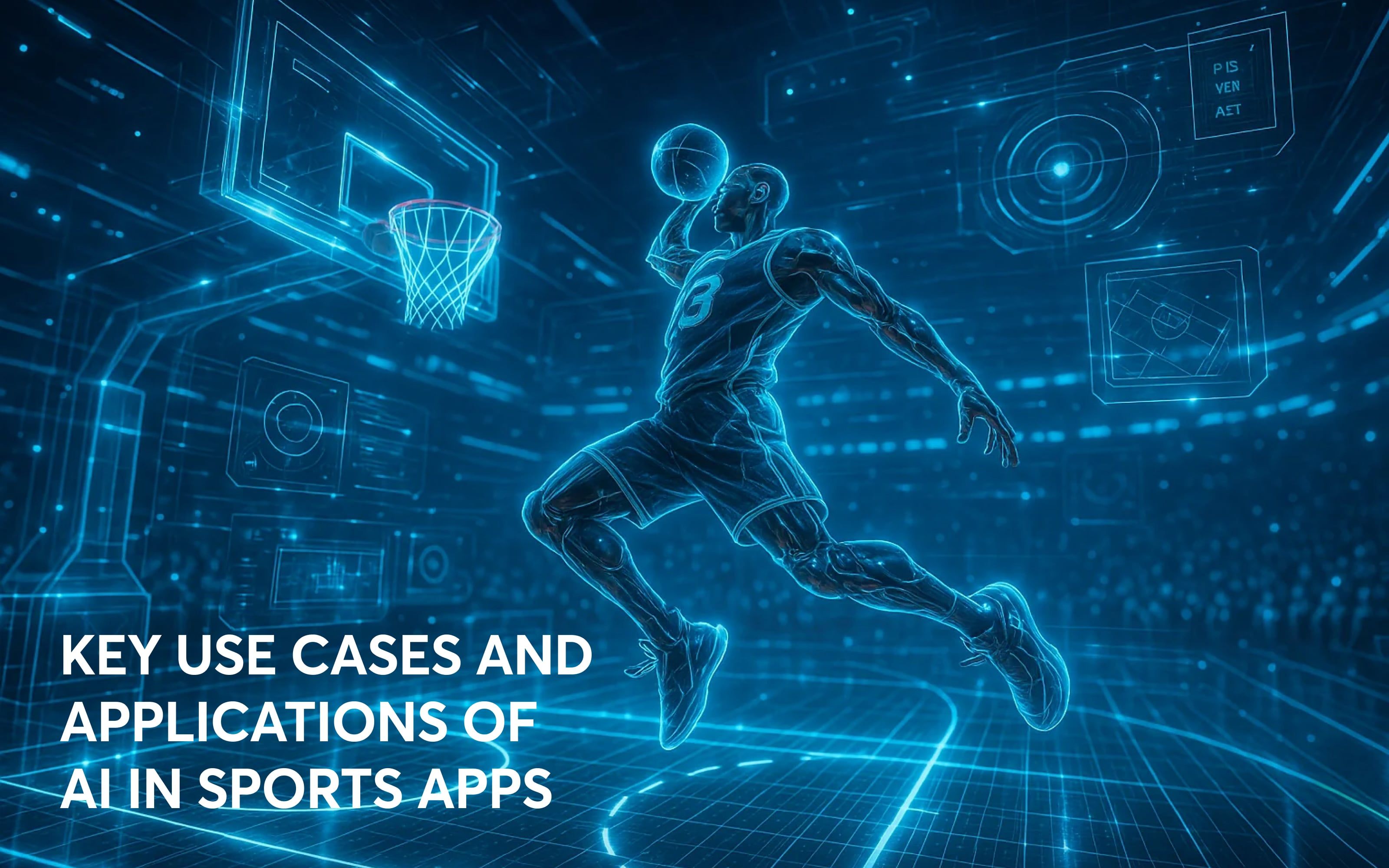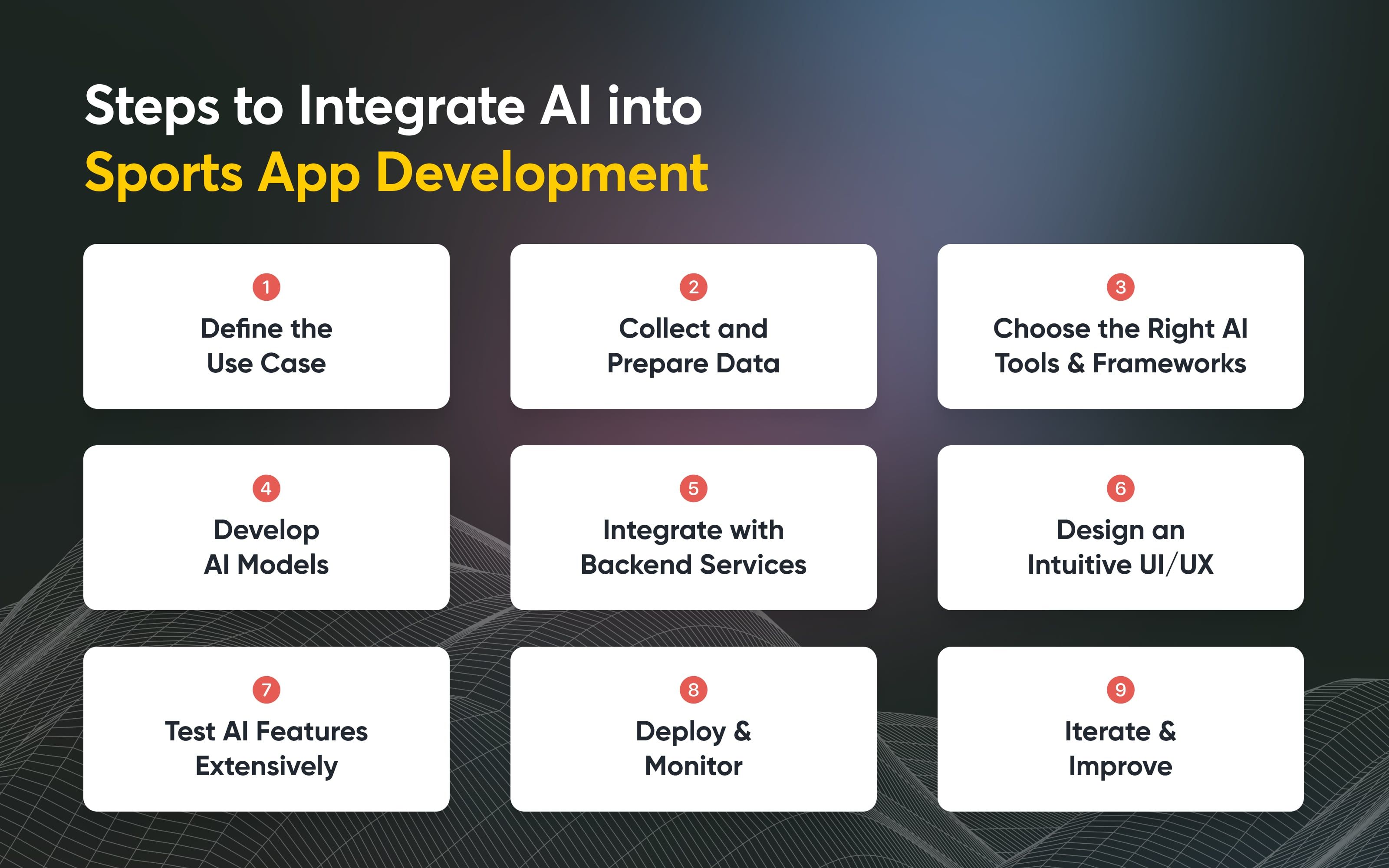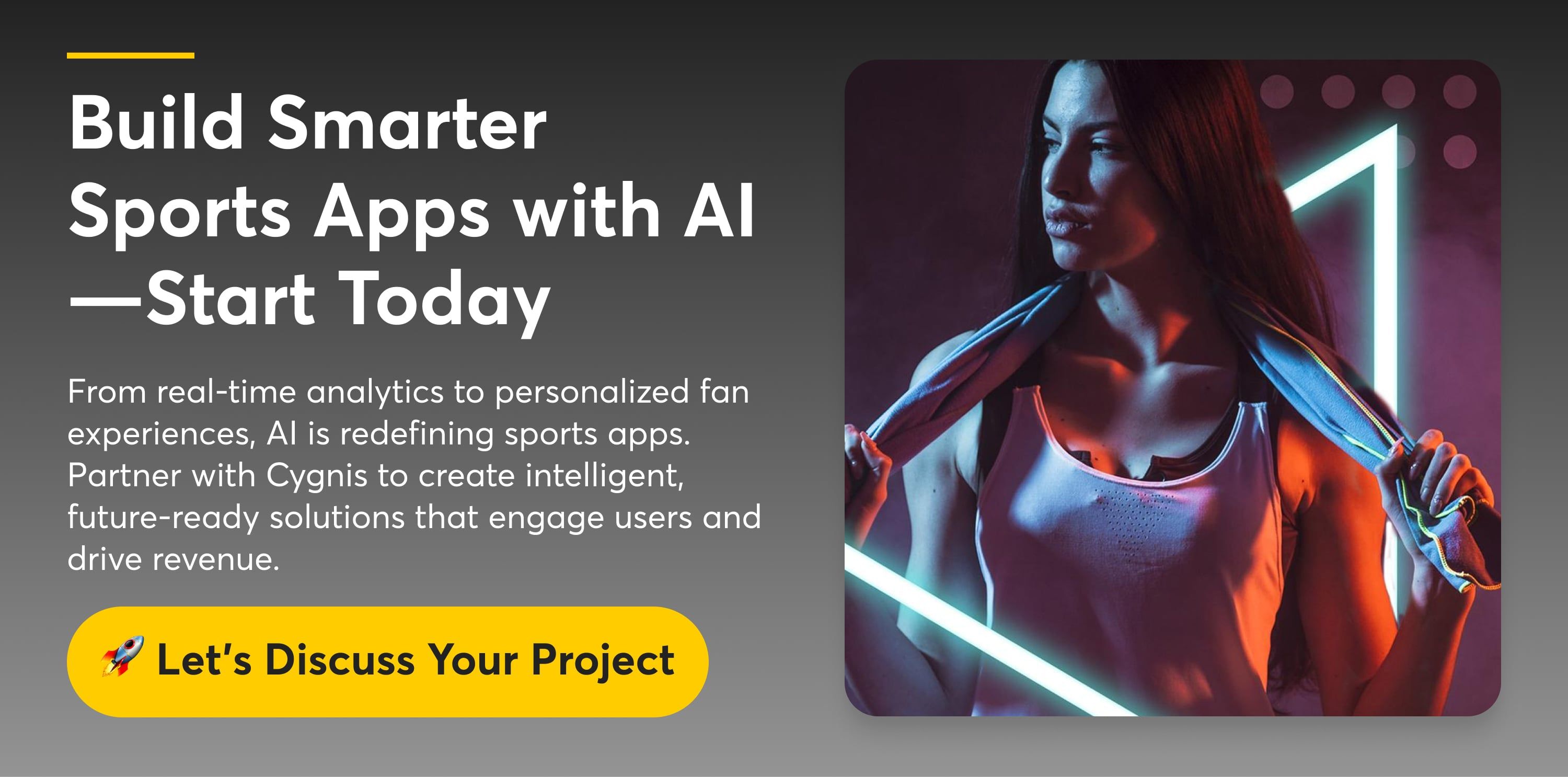Ever thought about how our connection with sports has evolved? What once meant going to stadiums or gathering around big TV screens is now just a tap away—thanks to mobile technology. Sports apps have become the go-to platform for fans, athletes, coaches, and even businesses to stay connected and engaged.
But what's taking things to the next level is the rise of artificial intelligence (AI) in sports app development. AI isn't just enhancing the experience—it's becoming a game-changer, transforming how we train, watch, analyze, and interact with sports in real time.
From immersive content and smarter interactions to customized training plans and real-time analytics that guide coaching decisions, AI is truly setting a benchmark in the sports industry. As a sports app user, coach, athlete, or fan, we're witnessing a revolution driven by AI-powered features that enhance every aspect of our experience.
Let's discover more about how AI is reshaping sports app development through innovation, data, and personalization. Learn about its benefits, key use cases, challenges, and real-world examples in this guide.
Key Statistics of AI in Sports App Development
- The global AI in sports market was valued at $2.2 billion in 2022 and is expected to grow quickly, reaching about $29.7 billion by 2032. (Source: Allied Market Research)
- Investing in emerging technologies like AI and investing in tech-driven sports experiences can turn casual fans into dedicated supporters who not only spend more but also share positive word-of-mouth. (Source: Capgemini Research Institute)
- Organizations using AI for fan engagement find it three times easier to commercialize content compared to traditional methods. (Source: Block Sports)
- In 2025, the solutions segment of the global sports analytics market is expected to account for over 66% of the market share. (Source: Meticulous Research)
- Stadiums and sports teams use AI-powered platforms to deliver targeted content, offering fans everything from personalized seat recommendations to exclusive behind-the-scenes access. (Source: Forbes Council)
- The global sports analytics market, valued at $3.2 billion in 2022, is projected to grow to $16.5 billion by 2031, with a CAGR of over 20%. (Source: Statista)
Estimated Revenue in Sports Apps and How AI Can Drive Growth (2025–2029)
The table below presents projected revenue generated by in-app purchases and paid downloads in the global sports app market from 2025 to 2029, based on Statista's data:
| Year | In-App Purchases (US$ million) | Paid Apps (US$ million) | Combined Total (US$ million) |
|---|---|---|---|
| 2025 | 12,014 | 1,057 | 13,071 |
| 2026 | 13,135 | 1,087 | 14,222 |
| 2027 | 14,321 | 1,121 | 15,442 |
| 2028 | 15,489 | 1,154 | 16,643 |
| 2029 | 16,595 | 1,187 | 17,782 |
Source: Statista – Sports Apps Revenue Outlook (Worldwide)
Cumulative Revenue (2025–2029):
- In-App Purchases: US$71.55 billion
- Paid Apps: US$5.61 billion
- Combined Total: US$77.16 billion
As the data shows, in-app purchases dominate revenue generation in the sports app ecosystem, far outpacing paid downloads. The growing reliance on freemium monetization models—combined with AI-powered personalization, dynamic pricing, and smart user retention techniques—can significantly boost user lifetime value. AI not only drives engagement but also fine-tunes monetization strategies, making these projected revenues more achievable and potentially surpassable.
Benefits of AI-Powered Sports Apps for Your Business

We've jotted down the top benefits of leveraging AI in sports app development for businesses:
Enhanced User Engagement
AI transforms passive viewers into active participants—think real-time polls, predictive gaming, and smart notifications. The more engaged your users are, the longer they stay, and the more valuable your platform becomes. By continuously offering interactive features, your sports app fosters deeper connections with fans, making it a central hub for their sports experience.
Personalized Fan Experiences
Imagine serving each user a custom feed—their favorite team's stats, tailored merch, or must-watch highlights. AI learns from user preferences and behavior to deliver personalized user experience. This hyper-personalization elevates the fan experience, making your app the go-to destination for everything sports-related.
Improved Player Performance & Training
Coaches and athletes rely on AI for precision breakdowns of movement, fatigue tracking, and injury prevention. Offer this, and your app becomes essential for teams, academies, and fitness enthusiasts. AI-driven training apps allow athletes to fine-tune their performance, making your app a key player in their growth and development.
Real-Time Data Analytics & Insights
From live match stats to fan behavior patterns, AI crunches data instantly. Broadcasters, analysts, and teams can make smarter decisions on the fly, giving your app a reputation for cutting-edge insights. The ability to provide real-time analysis makes your app a valuable resource for anyone involved in the game, whether on or off the field.
Increased Revenue Through Targeted Advertising
AI knows which fans are most likely to click. By delivering ultra-relevant ads, you boost ad performance, attract premium sponsors, and unlock higher revenue per user. This intelligent ad targeting enhances user experience and maximizes your app's monetization opportunities, offering advertisers a more effective way to reach their audience.
Optimized Game Strategies & Decision-Making
Teams using AI-powered analytics gain a tactical edge. Offer tools that simulate plays, analyze opponents, and suggest strategies—suddenly, your app is a must-have for coaches and analysts. By providing these insights, your app becomes integral to shaping game strategies and decisions, giving teams a competitive advantage.
Boosted User Retention
AI predicts when users might lose interest and re-engages them with personalized nudges—exclusive content, reminders, or rewards. Less churn means a stronger, more sustainable audience over time. By keeping fans invested with timely, relevant interactions, your app encourages ongoing engagement and fosters long-term loyalty.
Key Use Cases and Applications of AI in Sports Apps

AI is playing a vital role in transforming how sports apps function. From enhancing athlete performance to elevating fan experience, the use cases are wide-ranging. AI can analyze player behavior, predict outcomes, personalize content, and even detect injury risks before they occur. It allows coaches and analysts to make informed decisions using real-time data and historical trends.
Below are the top use cases that help you understand how AI is used in sports app development:
1. Performance Tracking & Game Analytics
With AI-powered performance tracking and analytics, you get a clearer understanding of how each player moves, reacts, and performs during a game. Using AI in sports analytics, businesses can turn large volumes of game data into easy-to-understand insights that guide their next move. Sports apps present this data through easy-to-read visuals and smart suggestions, making it easier to turn complex stats into game-changing moves.
Sports analytics apps can make apps more interactive using AI, and here's how:
- Live dashboards for player and team stats: AI-powered dashboards show live performance indicators, allowing broadcasters and coaches to act quickly.
- Real-time performance comparison: It helps compare players or teams instantly based on current match data and trends.
- On-the-fly tactical adjustments: Coaches use live analytical insights to tweak formations and strategies during matches.
- Interactive stats for broadcasters and fans: Fans get access to engaging real-time stats, boosting involvement and excitement.
IBM, with the US Open tennis tournament, is a great example of AI in sports analytics. Their system analyzes matches as they happen, estimates serve speeds, and uses past performance along with live data to predict potential winners. This real-time insight adds a new layer of strategy and engagement for players, coaches, and fans alike.
2. Injury Prevention & Risk Assessment
Injury prevention is one of AI's most valuable contributions to sports. It helps detect patterns that often precede injuries by using machine learning to examine biomechanics, workload, and movement data. Sports apps equipped with AI can track symptoms early so coaches can make smart adjustments to athletes' training plans before issues arise.
Below are the common use cases of AI-sports apps in injury and risk prevention:
- Early detection through biometric monitoring: AI-powered sports apps can integrate with wearable devices to track fitness stats to detect potential injury risks before symptoms surface.
- Fatigue tracking via wearable data: AI reads fatigue indicators like sleep and workload to ensure proper rest and reduce injury likelihood.
- AI predictions for injury-prone scenarios: Using historical data, sports apps predict risky conditions or patterns likely to cause injuries in training.
- Personalized recovery planning: AI tailors recovery timelines and regimens for each athlete, ensuring a safe, efficient return to peak form.
3. Personalized Training & Coaching Programs
With AI, sports apps offer deeply personalized coaching experiences. It analyzes comprehensive health, fitness, and medical data to deliver tailored workout routines and actionable feedback. Smart wearables enhance this by capturing real-time metrics that AI processes to optimize training schedules and suggest performance improvements.
Here's how AI helps coaches personalize training and coaching:
- Technique correction using computer vision: AI analyzes athlete movements, compares them to optimal form, and delivers precise, real-time corrective feedback.
- Interactive voice and text feedback: Smart systems provide live voice and text prompts, offering training cues and motivational support during practice sessions.
- AI-based skill assessment: The app evaluates performance across drills and sessions, generating scores and insights to monitor skill growth over time.
- Personalized coaching content delivery: Training content such as videos, articles, and tips is tailored based on individual performance data and progress trends.
Explore: Developing Fitness and Sports Training Mobile Apps: Empowering Athletes for Success
4. Fan Engagement & Personalized Content
Sports apps already offer immersive fan experiences, but AI takes things further. With natural language processing and smart recommendation engines, it personalizes every interaction. By analyzing viewing habits, favorite teams, preferred channels, and match history, AI suggests content that fans are most likely to enjoy. Whether it's upcoming games, highlight reels, or live stats, it makes each experience feel tailored to individual interests and needs.
NBA ID is the league's global membership program that offers fans a personalized and unified experience across NBA platforms. It gives access to exclusive content, tailored recommendations, and member-only benefits. AI enhances NBA ID by analyzing user behavior to deliver customized highlights, content, and notifications that match each fan's interests.
Benefits include:
- Customized content delivery through AI filters: Sports apps use AI to recommend news, highlights, and offers aligned with fans' unique viewing behavior.
- Behavior-based push notifications: AI analyzes in-app interactions to trigger relevant alerts, keeping fans updated on what matters most to them.
- Interactive fan games powered by AI: From match predictions to trivia, gamified elements are dynamically generated to keep fan engagement high and rewarding.
- AI-assisted event scheduling alerts: Based on past preferences and activity, sports apps notify fans about matches or events they're most likely to enjoy.
5. Talent Scouting & Recruitment
AI-powered sports apps are transforming talent scouting and recruitment by analyzing athlete performance data at scale. These apps help you track metrics like speed, agility, and decision-making to identify standout players across all levels.
Recruiters can gain access to unbiased, data-driven insights that help discover emerging talent often overlooked by traditional methods. With predictive modeling, AI can even forecast a player's growth potential. This allows coaches and scouts to make faster, more informed decisions and build stronger, future-ready teams.
- Skill assessment through video analytics: The app analyzes gameplay footage to assess technique, efficiency, and form, helping identify athletes with standout potential.
- Predictive success metrics for new players: Machine learning models forecast how players might adapt to new teams or perform in more competitive environments.
- AI-driven scouting reports: The app automatically generates detailed reports using in-game statistics, biometric data, and video highlights for every player.
- Comparison tools for player selection: Built-in tools compare athletes side-by-side using objective performance data to guide smarter recruitment decisions.
6. Social Media Sentiment Analysis
AI-powered sports apps use social media sentiment analysis to gauge how fans feel about players, teams, and matches in real time. By scanning posts, comments, and hashtags across platforms, the app identifies trending opinions, emotional tone, and overall fan mood. This insight helps teams adjust public relations strategies, spot potential controversies early, and understand what fans care about most.
Also Read: AI & Machine Learning for User Behavior Analysis and App Optimization
- AI-based sentiment scanning during live events: Sports apps analyze fan reactions in real time to capture changing moods and emotional responses.
- Content trend discovery through data signals: AI uncovers which themes, formats, or moments drive the most engagement across social platforms.
- Early warning for reputation risks: Spikes in negative sentiment are detected quickly, helping teams address issues before they escalate.
- Emotion-based audience grouping: Fans are classified by tone and sentiment, allowing apps to personalize content strategies for each emotional segment.
7. AI-enabled Smart Wearable Integration
Through AI-powered sports apps, smart wearables become more than just data collectors—they turn into intelligent performance tools. The app syncs with devices to analyze metrics like motion, cardiovascular activity, and fatigue levels in real time. This allows athletes and coaches to gain actionable insights, adjust training plans instantly, and avoid overexertion.
From personalized recovery tips to optimizing daily workouts, here's how the integration of wearables with AI ensures data is not just gathered but used meaningfully for continuous improvement.
- Biometric and performance data syncing: Wearables send real-time stats directly into the app for holistic performance views.
- Real-time condition alerts: The app sends immediate notifications when unsafe vitals or fatigue levels are detected.
- AI-powered training optimization: Workout plans are dynamically adjusted based on incoming biometric feedback and activity levels.
- Health and recovery trend tracking: Long-term analytics help users visualize their progress and recovery cycles.
8. Ticket Pricing & Demand Forecasting
AI-powered sports apps bring a smarter approach to ticket pricing by analyzing real-time demand, historical sales, team performance, and fan behavior. Instead of relying on fixed pricing, the app uses predictive models to forecast demand and adjust ticket prices dynamically.
It helps maximize revenue while ensuring seats are filled by offering the right price at the right time. Teams and event organizers gain clearer visibility into fan interest, allowing for better promotions, targeted offers, and improved event planning.
- Dynamic ticket pricing using demand prediction: AI adjusts prices based on real-time demand trends, weather, and opponent popularity.
- AI-based audience segmentation: Different pricing strategies are applied for casual vs. loyal fans.
- Real-time adjustments for unsold inventory: Tickets are discounted strategically to minimize empty seats.
- Historical sales pattern analysis: Sales data helps forecast future demand and plan promotions.
9. Fraud Detection in Betting & Ticketing
AI in sports betting and ticketing plays a crucial role in detecting and preventing fraud. Through AI-powered sports apps, suspicious patterns—like irregular betting behavior, duplicate ticket purchases, or account manipulation—are identified in real time.
Machine learning models analyze massive volumes of transactional and user data to flag anomalies quickly and accurately. This not only helps maintain fair play and transparency but also protects fans, teams, and event organizers from potential financial and reputational damage.
- Detection of unusual behavioral patterns: AI monitors transaction behavior to flag suspicious betting or ticketing activity in real time.
- Immediate alerts for suspicious actions: The app sends instant notifications when unusual patterns suggest possible fraud or unauthorized user activity.
- Verification checks for resale integrity: AI examines ticket scans and user histories to detect counterfeit resales or fake listings quickly.
- Enhanced purchase security using smart ID: Behavioral biometrics and AI combine to verify identity during purchases and block fraudulent attempts efficiently.
10. AI-Driven Chatbots for Fan Interaction
AI-driven creates a direct and interactive communication channel between fans and their favorite teams. These chatbots answer questions, share match updates, recommend content, and even guide users through app features—all in real time.
Powered by natural language processing, they understand fan preferences and deliver personalized experiences. Chatbots make interactions seamless, timely, and engaging. One example is FC Barcelona, which integrated an AI-powered chatbot into its official app. Fans receive real-time match updates, ticket information, and personalized content that boost engagement and streamline interaction across digital platforms.
- Round-the-clock assistance and updates: AI sports apps use chatbots to deliver instant support for schedules, tickets, and event updates.
- Language-inclusive fan communication: Built-in multilingual chatbots help sports fans engage in their native language for seamless communication and support.
- Smart suggestions based on engagement: The app's chatbot recommends games, news, and gear by analyzing each user's in-app behavior and preferences.
- Streamlined FAQ handling and ticketing: AI handles common fan questions and automates ticket booking, improving user experience and reducing wait times.
Steps to Integrate AI into Sports App Development

Below are the key steps required to integrate AI within your sports app development:
Define the Use Case
This is the foundation of AI integration. Clearly define what your sports app aims to achieve. Identify the target users, their needs, and the AI features that deliver the most value. A well-defined use case guides your data collection, tool selection, and overall development strategy—ensuring your AI efforts are purposeful and impactful.
Collect and Prepare Data
AI relies heavily on data. Gather diverse, high-quality datasets such as player stats, training videos, injury logs, GPS tracking, and fan sentiment. Clean and structure this data to remove errors, fill gaps, and ensure consistency. The better your data, the more accurate your models will be—this step is essential for building reliable AI features in your sports app.
Choose the Right AI Tools & Frameworks
Not every framework suits every use case. Choose AI/ML tools that best align with your goals—TensorFlow and PyTorch for deep learning, OpenCV for vision tasks, spaCy or Hugging Face for NLP. The tools should support scalability, real-time processing (if needed), and integration ease. A thoughtful tech stack can speed up development and future-proof your sports application.
Develop AI Models
Once you've chosen your tools, start building or fine-tuning your models. Use historical data to train algorithms that can classify actions, make predictions, or generate content. For example, you might train a model to predict player fatigue or generate match commentary. Use supervised or unsupervised learning depending on your goals, and validate the model with fresh data to ensure accuracy.
Integrate with Backend Services
Seamlessly connecting your AI models to the backend ensures efficient data processing and smooth user interactions. Use APIs, microservices, or serverless functions to send data to the models, get responses, and display outputs in real time. This integration also enables your app to handle multiple AI tasks in parallel—like pushing alerts, updating dashboards, or generating dynamic content on the fly.
Design an Intuitive UI/UX
Even the smartest AI features won't shine if users can't understand or access them. For this, you need to prioritize user experience by designing simple, intuitive interfaces. Let fans easily explore match predictions and let players interact with performance dashboards. Use visual elements like charts, heatmaps, or feedback overlays. A well-designed UI makes AI outputs actionable, encouraging users to engage and return to your app.
Test AI Features Extensively
Before launch, rigorously test your AI models across different devices, users, and edge cases. Validate the accuracy of predictions, speed of responses, and quality of outputs. Simulate real-world scenarios such as live matches, connection drops, or multilingual data inputs. Testing ensures stability and builds user trust. This step is also crucial to comply with data ethics and privacy regulations in sports.
Deploy & Monitor
Once development is complete, push your AI features into production. Use cloud platforms for scalability and set up monitoring tools to track model performance, latency, and anomalies. Monitor how users interact with AI-powered features and ensure nothing breaks during high-traffic events. A stable and observable deployment process helps in identifying bugs early and maintaining long-term app quality.
Iterate & Improve
AI is never a one-time job. Continuously analyze user feedback, feature performance, and model accuracy. Use these insights to retrain models, improve UX, and introduce smarter functionality. For instance, fan engagement models can improve with new season data. Iteration helps you stay ahead of user needs, sports trends, and competitive features, keeping your app relevant and high-performing over time.
Challenges and Considerations of AI in Sports Apps
While AI brings powerful capabilities to sports apps, it also introduces important challenges and considerations. Issues like data privacy, algorithm bias, and the need for constant model updates must be carefully addressed. The table below lists out challenges of AI along with their solution:
| Challenge | Explanation | Solution |
|---|---|---|
| Data Quality & Availability | Inconsistent or incomplete data can lead to poor AI predictions or insights. | Partner with sports leagues, teams, or wearable manufacturers to access verified and comprehensive data. |
| Real-Time Processing Needs | AI models can struggle with latency when processing live, fast-moving data. | Implement edge AI, use low-latency cloud platforms, and employ real-time APIs to handle high-frequency updates. |
| Model Accuracy & Bias | Models can underperform if trained on biased or incomplete datasets. | Regularly retrain models with diverse datasets, incorporate fairness checks, and ensure data represents all demographics. |
| High Development & Maintenance Costs | Building and maintaining AI features can be expensive, especially for startups. | Start with essential AI features; utilize pre-trained models and open-source frameworks to reduce development time and cost. |
| Integration with Legacy Systems | Integrating new AI systems with existing infrastructure can be complex. | Use microservices architecture, APIs, and middleware solutions to facilitate seamless communication between systems. |
| User Privacy & Data Security | Sports apps handle sensitive user data, requiring robust security measures. | Implement data encryption and anonymization techniques and comply with regulations like GDPR and CCPA. |
| Lack of Interpretability in AI Models | Many AI models, especially deep learning, act as "black boxes," making them hard to interpret. | Utilize explainable AI (XAI) frameworks to provide transparency in AI decisions and model behavior. |
| Scalability During Peak Events | High traffic during live events can cause app slowdowns or crashes. | Use auto-scaling cloud services, load balancing, and content delivery networks (CDNs) to manage traffic spikes. |
Final Thoughts
AI is transforming sports app development by delivering smarter, more personalized, and engaging experiences for athletes, coaches, and fans. From real-time performance tracking and injury prevention to fan interaction and dynamic ticket pricing, AI's impact is both wide-reaching and practical. It helps users make informed decisions, improves player safety, and keeps fans closely connected to the action.
However, successful implementation requires careful attention to data accuracy, user privacy, and evolving expectations. As technology continues to advance, AI will remain central to the future of sports—helping apps become more intelligent, interactive, and aligned with the ever-changing needs of the sports community. The game is changing, and AI is leading the way.











